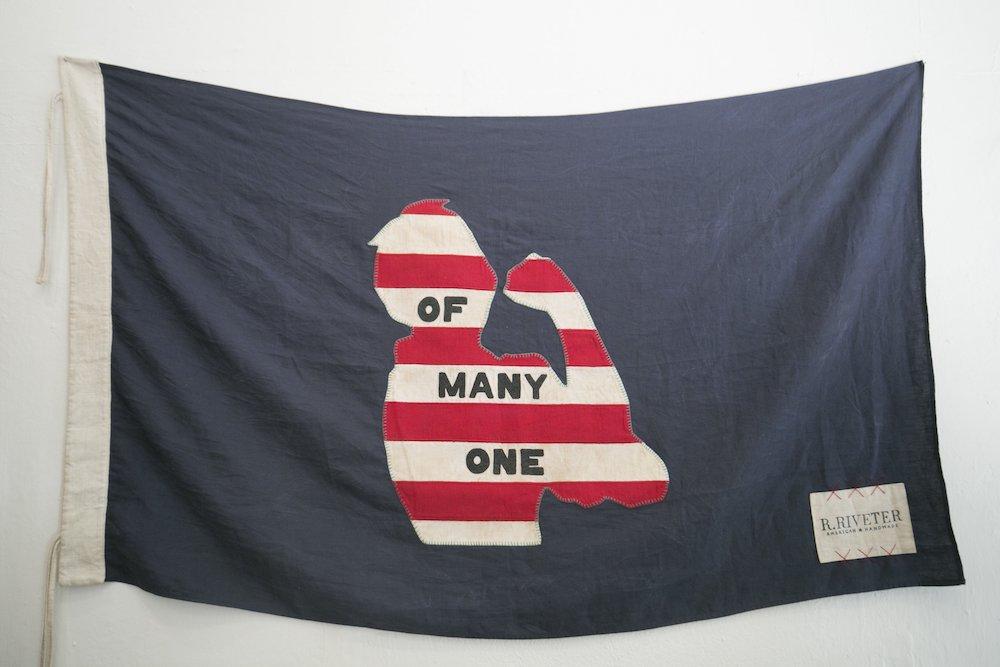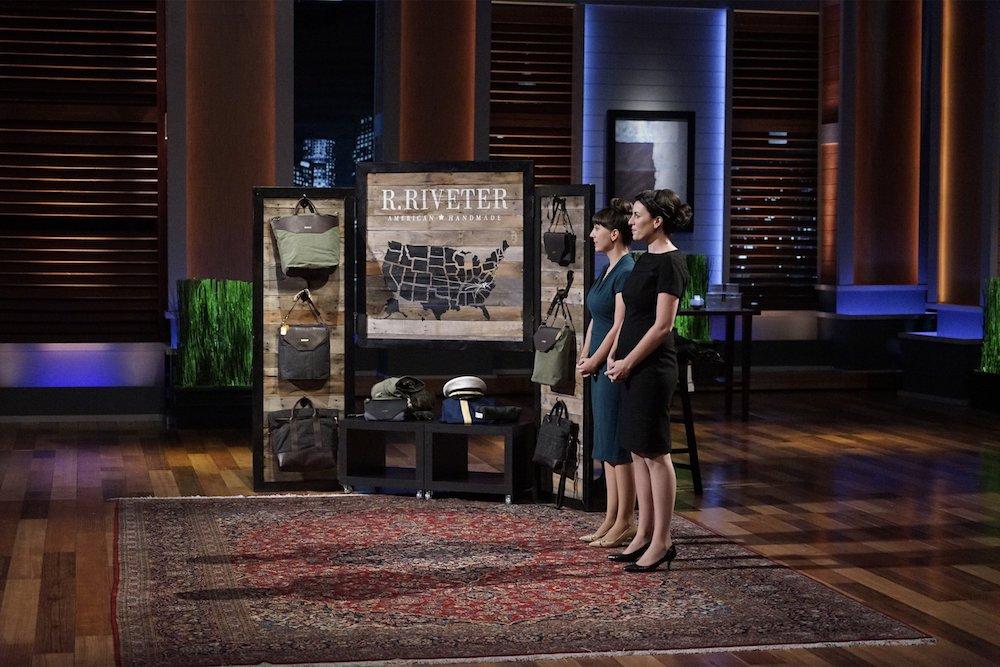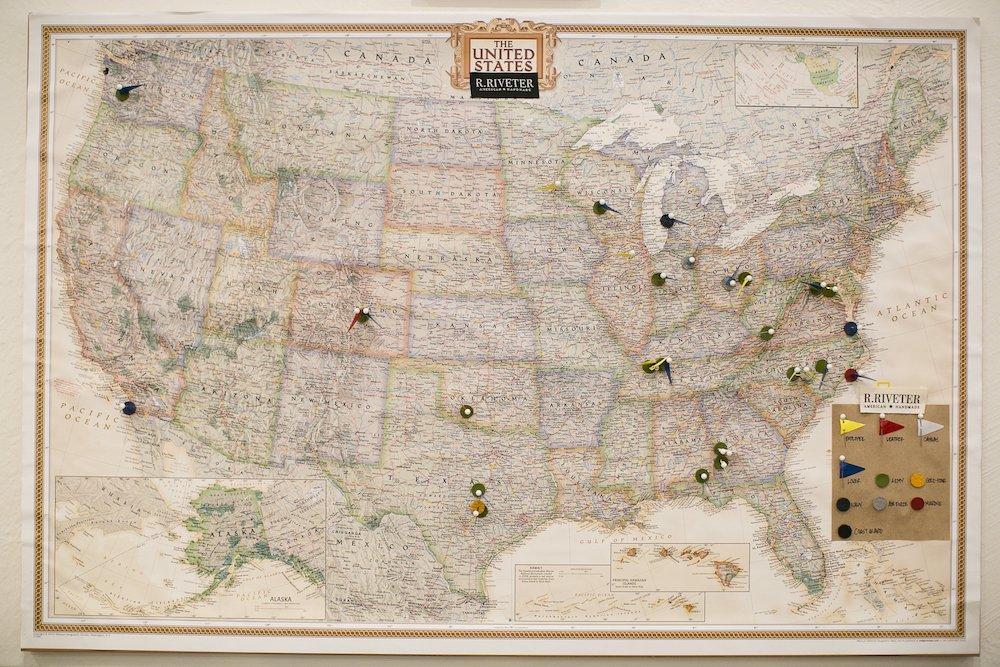Over the last three years, R. Riveter — the popular maker of handmade leather handbags crafted by military spouses stationed across the U.S. — has increased sales 1,273%.
In addition to partnering with Mark Cuban after a 2016 Shark Tank episode, during 2017-2018, the company …
- Lifted conversion rates +55% YoY
- Increased total orders +28% YoY
- Boosted returning customer rate +18% YoY
- Improved 2017 YoY holiday sales +52%

“We’ve been with Shopify from day one and it handled the surge in traffic from our Shark Tank appearance without any problem at all.
It’s a sacrifice few ever see.
Not the obvious stress of deployments or juggling children and erratic schedules without the help of a spouse. This sacrifice is one that slowly but surely erodes the confidence and self-esteem of military wives throughout the nation …
“I got turned down for another job,” Lisa Bradley recalls saying repeatedly to fellow military spouse Cameron Cruse when their husbands were stationed in Georgia. “That’s how we became friends — we really struggled to find work despite being overqualified.”

Both have Masters degrees. Each is creative and full of business smarts and grit. Yet employer after employer told Bradley and Cruse they lacked the experience necessary for the positions for which they had applied.
Why? Because military spouses move on average every 2.9 years. As a result, employment gaps open up and plant seeds of skepticism in would-be employers. In fact, unemployment among military spouses is 42% despite the fact that 85% want or need to work.
But, what if that sacrifice no longer had to be made?
That’s the question Bradley and Cruse asked themselves: might there be a way to build a business that provides military spouses with portable employment opportunities regardless of where they live or how often they move?
The Mission, the Fire, and the Icon
The decision was made the week of Veterans Day 2011, in the dead of winter. “It was time to stop being part of the problem,” Bradley explains, “and create a solution.”
Bradley and Cruse kick things off humbly at first, their new company headquarters in the attic atop Cruse’s home. “We didn’t want a lot of overhead,” says Bradley. “We didn’t have a lot of resources and Cameron had a one-year-old at the time so that’s how we started.”
Each charged two thousand dollars to their credit cards to purchase a commercial sewing machine and a small supply of leather and canvas. The idea was to was to make handbags, earn some money, and ultimately offer military spouses across the country an opportunity to join them in earning flexible income no matter where they lived.

That vision, however, was almost immediately put to the test …
To stay warm in the attic, Bradley and Cruse bundled up in winter clothing and sewed handbags until the wee hours of the morning. One night, while working late, Bradley got too close to the kerosene heater.
“My pants caught on fire,” she says with a laugh. “Luckily they were made out of a plastic-like material so they just melted before the fire could spread.”
Those were the first few days of what would become R. Riveter. The name pays homage to Rosie the Riveter, a World War II icon that symbolizes the contribution women made to the workforce that helped win the war.

For the first six months, R. Riveter was a two-woman show. “We couldn’t keep up with demand,” remembers Bradley, “no matter how much coffee we drank.”
That’s when R. Riveter created the remote manufacturing network they’d founded their business to bring to life. Other military spouses, known as Riveters, across the country crafted handbag pieces. Pieces were sent to a fabrication shop in North Carolina. There they were assembled and shipped.
In 2015 — a year after a successful Kickstarter campaign — R. Riveter opened a large retail store in North Carolina where Cruse had moved. And demand exploded.
“Up until then,” Bradley recalls, “each bag was custom-made, and customers could choose their color, liner, and style. That got us the cash flow we needed but to scale we knew we needed to start selling from pre-made inventory.”
The break R. Riveter needed was in sight. But to get there, they’d have to do two things both courageous and terrifying on the surface.
First on the list: fire one of the co-founders …
“I Love This, But”
Depending on the design, as many as twelve Riveters are involved in making each of the company’s handbags. Each Riveter stamps their personal Riveter number on the piece they make which allows customers to look inside their bags and see evidence of all the Riveters responsible.
But there’s one Riveter whose number — RR002 or RR001 (depending on which founder you ask) — you’ll never see stamped inside one of the company’s handbags. As Bradley puts it:
I actually got fired from sewing pretty early on.
The realization that Bradley was less than a stellar seamstress came at an R. Riveter pop-up boutique when a customer who had already purchased a handbag made by Bradley showed up with a polite yet embarrassing complaint.
“I love this, but things keep falling out the pockets.” And that customer wasn’t the only one. Without knowing it, Bradley had sown her last shipment with the pockets upside down.
Thankfully, Cruse — a designer and expert seamstress — took over production, and Bradley gave her focus to what she does best: run the business.
And run it she has …
In 2016, R. Riveter appeared on Shark Tank where Bradley and Cruse made their pitch and wound up with three offers: “It was the most exhilarating and terrifying day of our business lives.”

The ladies accepted Mark Cuban’s offer of $100,000, which Bradley says was made after Cuban noted that manufacturing in one spot is notoriously difficult and that he was impressed with the remote manufacturing network R. Riveter had created.
Following the show, R. Riveter increased its remote network of Riveters from fifteen to thirty to meet demand and further its mission.

Additionally, the company upgraded to Shopify, an ecommerce solution for high-volume merchants focused on growth.
As Bradley explains: “We’ve been with Shopify from day one and it handled the surge in traffic from our Shark Tank appearance without any problem at all.”

In addition to Shopify, R. Riveter’s technology stack includes the following tools that are contributing to accelerating revenue growth:
Avalara: an automated tax compliance solution that easily integrates with your business tools.“With many remote employees located in different states, we take our nexus very seriously. Avalara has significantly reduced the administrative complexity of a remote working company.”
Shopify Flow: an ecommerce automation platform designed to offload manual backend tasks that free you to focus on higher value tasks“We have been using Shopify Flow for things like inventory alerts and for high-risk orders. This really helps keep our marketing and sales teams out of the weeds, but still able to take timely action.”
Shopify Scripts: small pieces of code that allow you to create personalized experiences for your online store customers in their cart and at checkout“Shopify Scripts — and, in particular, the Script Editor — gives us a lot more flexibility when a specific tweak needs to be done to our offerings. For instance, we offer expedited shipping on select products during the holidays.”

“We heavily rely on our online sales and utilizing Shopify’ Partners to stay relevant is imperative in a fast-changing online world.
The Numbers That Matter
Besides helping solve a major problem facing military spouses, R. Riveter’s financial and operational performance is impressive. The company grew year-over-year sales 630% between 2015-2016.
If you extend that time from to the last three years — as Inc. Magazine does for their annual Top 500 list — it’s even more impressive: 1,273%. In addition, the company has …
- Lifted conversion rates +55% YoY
- Increased total orders +28% YoY
- Boosted returning customer rate +18% YoY
- Improved 2017 YoY holiday sales +52%
As impressive as those numbers are … they’re not the numbers that drive R. Riveter. These are the numbers that do:
- 33% of every dollar goes back into the hands of a military spouse
- In 2017, R.Riveter provided income opportunities to 103 military families
It’s a mission that started with handbags but is now morphing into new creations like storage boxes made of license plates that remind service members of the places they once and will again call home.
Describing the Riveter network, Bradley notes:
“What we’re really building is a huge network for success. The modern American woman feels like she has to do it all and the Riveter network is a place military spouses can go to get the support they need from people who understand.”
What’s Next?
While Cruse and Bradley aren’t ready to show their cards, you can bet that any future moves will be based on the same mission that propelled R. Riveter from a frigid Georgia attic and onto a national stage where a billionaire investor was charmed.
“Whatever the future holds our focus will be helping military spouses. It has been a phenomenal experience and we’re just getting started.”
Read more
- GOOD AMERICAN: From Million-Dollar Launches to Driving Sales with Automatic Product Tagging & Inventory Flags
- How This Lifeguard is Disrupting Women’s Athletic Swimwear
- How Channelling “Your Inner Ten-Year-Old” Is the Secret to Brandon Steiner’s $50 Million Empire
- Ryonet Finds Ease and Speed for Both Its Online Wholesale Businesses
- Patience, and Its Refusal To Sell For Less, Boosted Hammitt’s YoY Revenue 233%
- rockflowerpaper Saved $200K Per Year Switching from Symphony Commerce
- How a Broke Fitness Trainer Accidentally Created a Multimillion-Dollar Business Without Advertising
- How a Premium Electric Bicycle Maker Doubled Sales and Derisked the Purchasing Decision
- How 2 Chainz Sold $2.1 Million of Ugly Santa Sweaters in 30 Days


